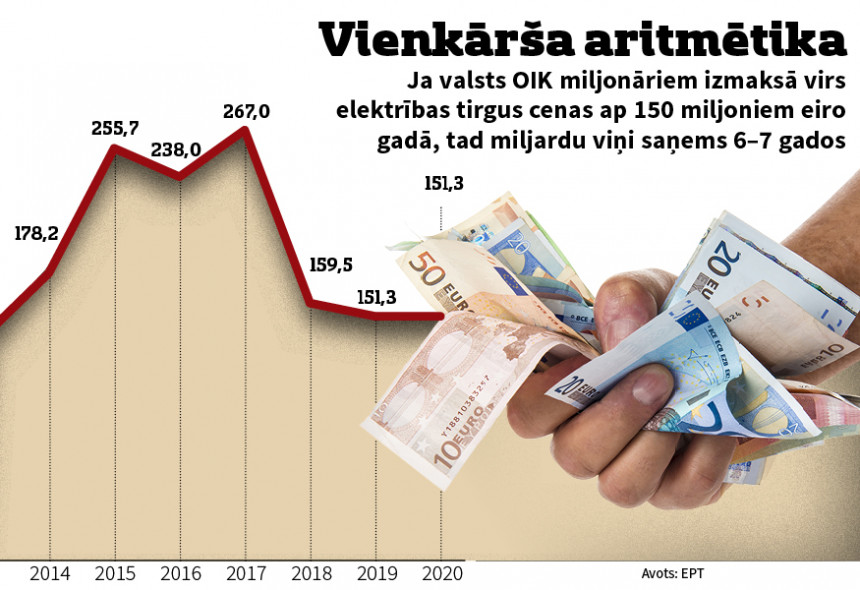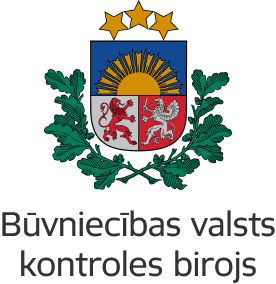OIK millionaires might get the next billion

Politicians have entrusted the courts with protecting the rise in electricity prices with the mandatory procurement component (OIK), whose judgments must comply with the laws adopted by the same politicians who once gave licenses to entrepreneurs to obtain OIK.
Decisions to deprive the right to increase the price of electricity that has not been produced in accordance with the regulations (even if it is not actually produced at all, but is Latvenergo's electricity has been cycled through the meters) by Latvian court instances are moving at a snail's pace and not always forward. The decision-maker and promoter of such decisions in the courts since the beginning of last year has been the State Construction Control Bureau (SCCB). Here is the beginning of the Bureau's review of the progress during its first year of operation created for Neatkarīgā: "In total, SCCB is currently involved in 13 proceedings related to the mandatory electricity procurement rights, of which four are at first instance, five are on appeal and four are on cassation..." The answer is worthy of being made public and preserved in history without any abbreviations or amendments. Therefore, the full answer is attached to this publication.
The course of the litigation confirms the suspicions expressed by Neatkarīgā (in Latvian) after the SCCB informed about what it had done in the first half of the year since they started supervision of the OIK beneficiaries. Namely, that “it is not yet clear from when and whether the regulatory enactments are such that they prohibit the use of not self-produced electricity for the production of electricity and the non-use of the obtained heat for heating or production. (...) Since January 1 this year, the SCCB has been tasked with monitoring compliance with these rules. During the first half of the year, it has been able to check 143 of a total of 328 power plant reports and has found that in 10 cases even the reports do not meet the norms for receiving OIK. The specific producers would thus lose a total of 1.22 million euros. They have appealed against all SCCB decisions to courts that have not yet ruled. Consequently, it has not been examined whether the norms of the law are formulated in such a way that it would be understandable when they are violated or not. However, these norms were issued by the deputies of the Saeima from the parties, where the leaders are the same ones who personally granted the permits to receive OIK to entrepreneurs.”
If during the second half of last year SCCB was able to increase the number of SCCB decisions that reached the courts from 10 to 13, then it must be concluded that not only the courts but also SCCB work at a snail's pace. The results of the first half of last year were presented with an explanation that for the institution, the inspection of power plants not from the point of view of building safety, but from the point of view of operation is a new direction, which takes time to become practiced in. The second half of the year signals that it was just a pretext. Now the universal disclaimer for any unfinished work is Covid-19.
While SCCB is fighting for the right not to pay OIK in the amount of 1.22 million euros, in 2020 the state has paid a total of 151.3 million euros to OIK beneficiaries. The question of whether the fight against OIK fraud does not cost the state more than is saved by unpaid money. 1.2 million euros is not an unattainable amount, if we add up all the costs that the SCCB, the Ministry of Economics (MoE), the courts and other institutions devote to paying salaries and maintaining jobs directly to the staff involved in OIK matters.
SCCB director Svetlana Mjakuškina defended the institution's results for the first half of the year, arguing that every euro not paid for OIK is important and that cancellation of OIK entitlements to fraudulent companies amounts to 14.6 million euros, as much as the state has undertaken to pay to these recipients of OIK at the expense of electricity users in accordance with the terms of the payment agreements. Of course, 14.6 million euros is much more than 1.2 million, but 14.6 million euros is a small amount compared to a billion euros and more than the state has promised to OIK beneficiaries. By reducing these costs by 14.6 million euros per year, the overall reduction will remain negligible compared to the total costs.
The involvement of the SCCB in the crackdown on OIK recipients is another imitation of the politicians' promise to abolish the OIK. With such a promise, the deputies and parties got into the 13th Saeima. The 13th term of the Saeima is coming to an end, but only imitations of action have been made in fulfilling the promise.
The involvement of the SCCB was one of the imitations of action, as the first report of the SCCB does not differ in quantitative terms from the last report of the SIA Enerģijas publiskais tirgotājs (Public energy trader, EPT), which previously performed the same function. On the website of the MoE there is a message dated January 23, 2020 that “in 2019, the MoE significantly strengthened the control of power plants that have been granted mandatory procurement rights. The EPT has also completed all on-site inspections of power plants operating in the mandatory procurement system. As a result of all these inspections, during 2019 the mandatory procurement rights were revoked for 21 power plants, which has allowed to prevent a possible increase in the total costs of OIK in the next 10 years by approximately 31.5 million euros." With these 31.5 million over 10 years, EPT has operated at least microscopically, and still more efficiently than SCCB, with the figure of 14.6 million euros for the first half of 2020. Further, the data are no longer comparable, as the state spent most of 2020 in an emergency mode, when there was no reason to require regular work from public authorities.
It should be noted that the announcement of a decision not to pay money to a member of the OIK scheme is not yet a definitive confirmation that it has not received and will never receive this money.
It is worth highlighting the organization of work on power plant inspections. Let's believe the MoE that the EPT had "completed all on-site inspections of power plants operating in the mandatory procurement system."
So, at the moment when there was a supervisory institution in the country, whose employees had visited all the monitored objects, the supervisory function was transferred to another institution, whose employees started their trip around Latvia from the beginning, at the expense of taxpayers.
Another imitation of action in the execution of the MoE is to hide OIK payments under electricity supply payments. The MoE informs that “it has developed a scenario for the gradual reduction of the OIK, which envisages directing the dividends of the Latvenergo group (and the corporate income tax related to their disbursement) to the gradual reduction of the OIK in the coming years.” In other words, the increase in Latvenergo's tariffs corresponds to the decrease in OIK, as these tariffs are a source of money that the state receives in the form of dividends and then returns to private entrepreneurs. Such a maneuver is not new either, but a method that has already been tested for the election of the 13th Saeima, which the ruling parties also want to use for the 14th Saeima elections.
Authentic

The State Construction Control Bureau regarding litigation with entrepreneurs who have been deprived of the right to receive OIK:
- In total, SCCB is currently involved in 13 proceedings related to the mandatory electricity procurement rights, of which four are at first instance, five are on appeal and four are on cassation.
In three appeals, the first-instance judgments are in favor of traders (two of which have been appealed by SCCB, the third is still withing the time-limit), while in two appeals, the first-instance judgments are unfavorable to the trader.
In addition, in 2021, the decision of the appellate instance regarding the rejection of the trader's application came into force in one case, and the trader has not appealed the judgment.
In all four cases in the cassation instance, the judgments of the appellate instance were unfavorable to the trader. Legal proceedings have not yet been initiated against the cassation complaints submitted by traders. At the same time, in 2021, the Senate has refused to initiate cassation proceedings in three cases and the judgments of the appellate instance are valid, by which the applications of traders have been rejected.
COVID-19 has not directly affected the legal proceedings - according to the sub-paragraph 5.19 of Order No. 655 “Regarding Declaration of the Emergency Situation” of Cabinet of Ministers on 06.11.2020. a court shall use the written procedure as much as possible or shall examine cases remotely, thus, the legal proceedings proceed in their usual course.
*****
Be the first to read interesting news from Latvia and the world by joining our Telegram and Signal channels.